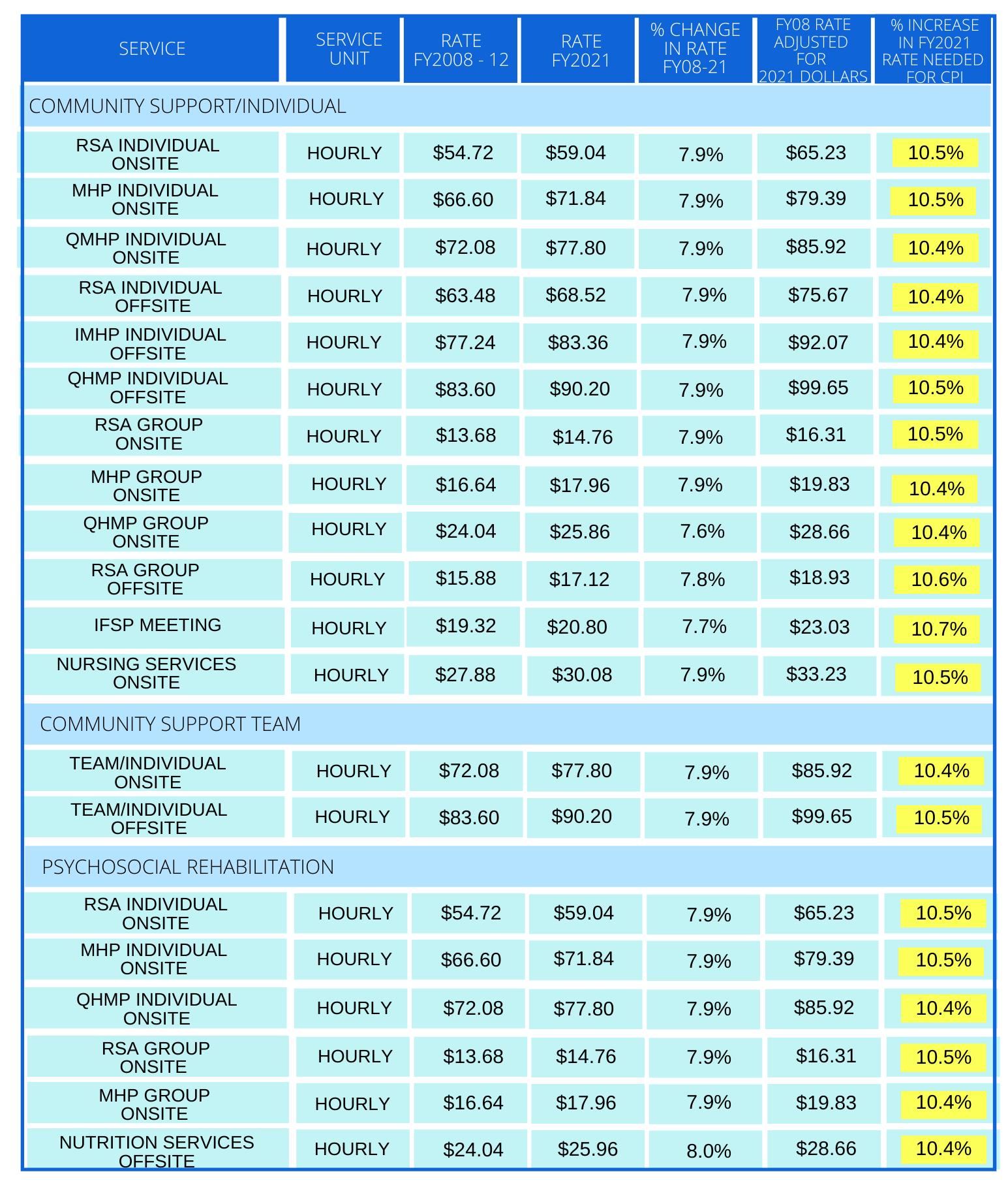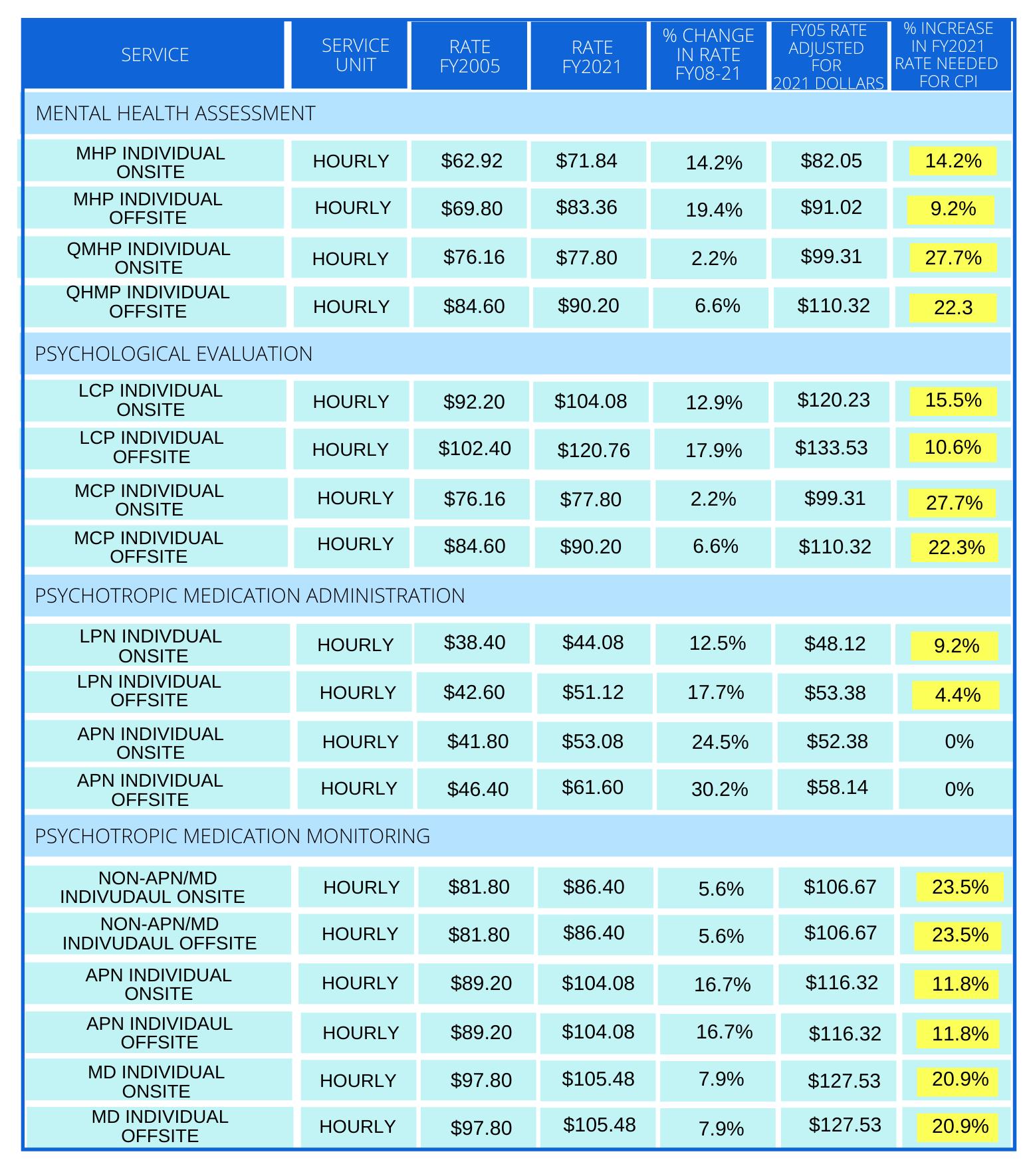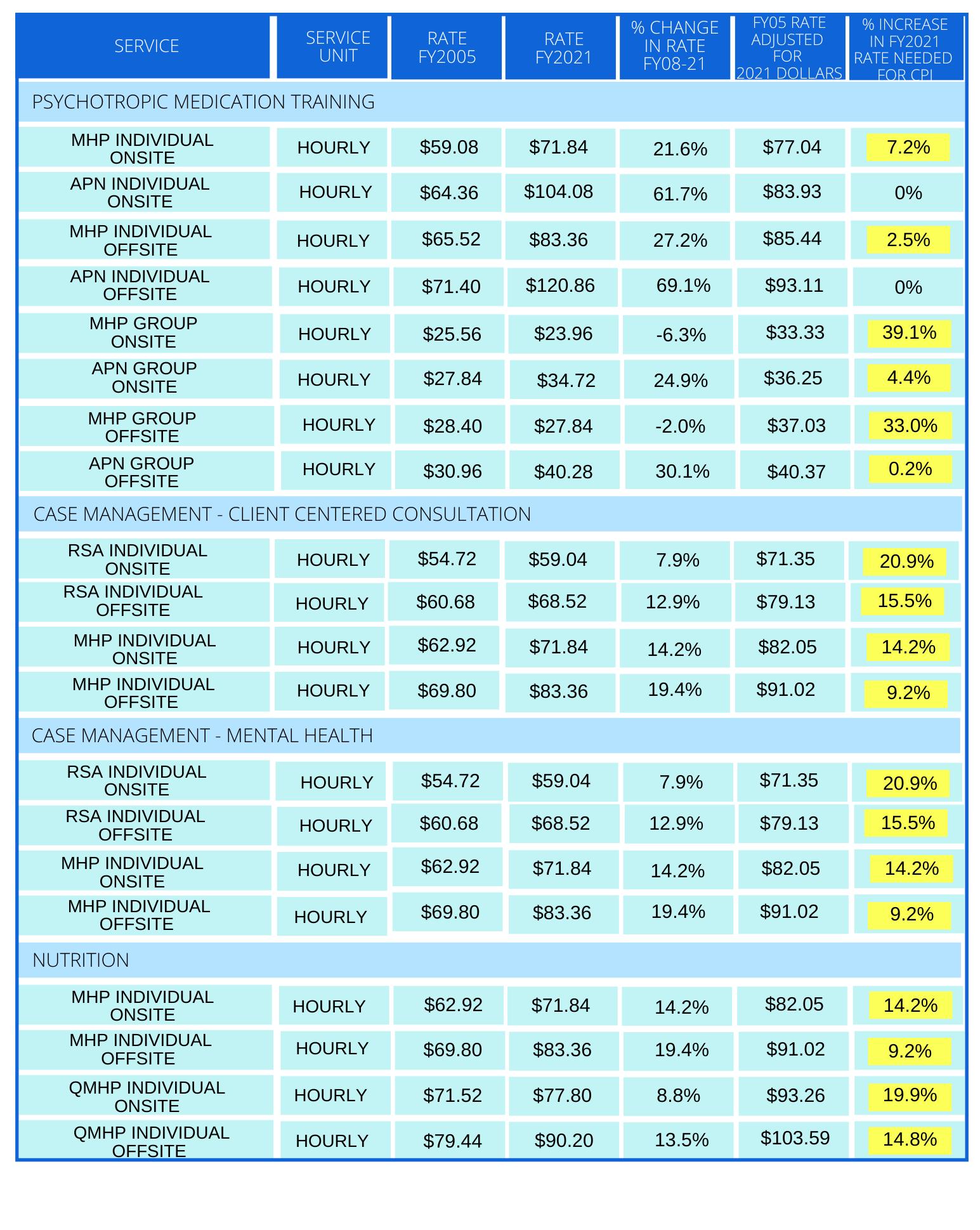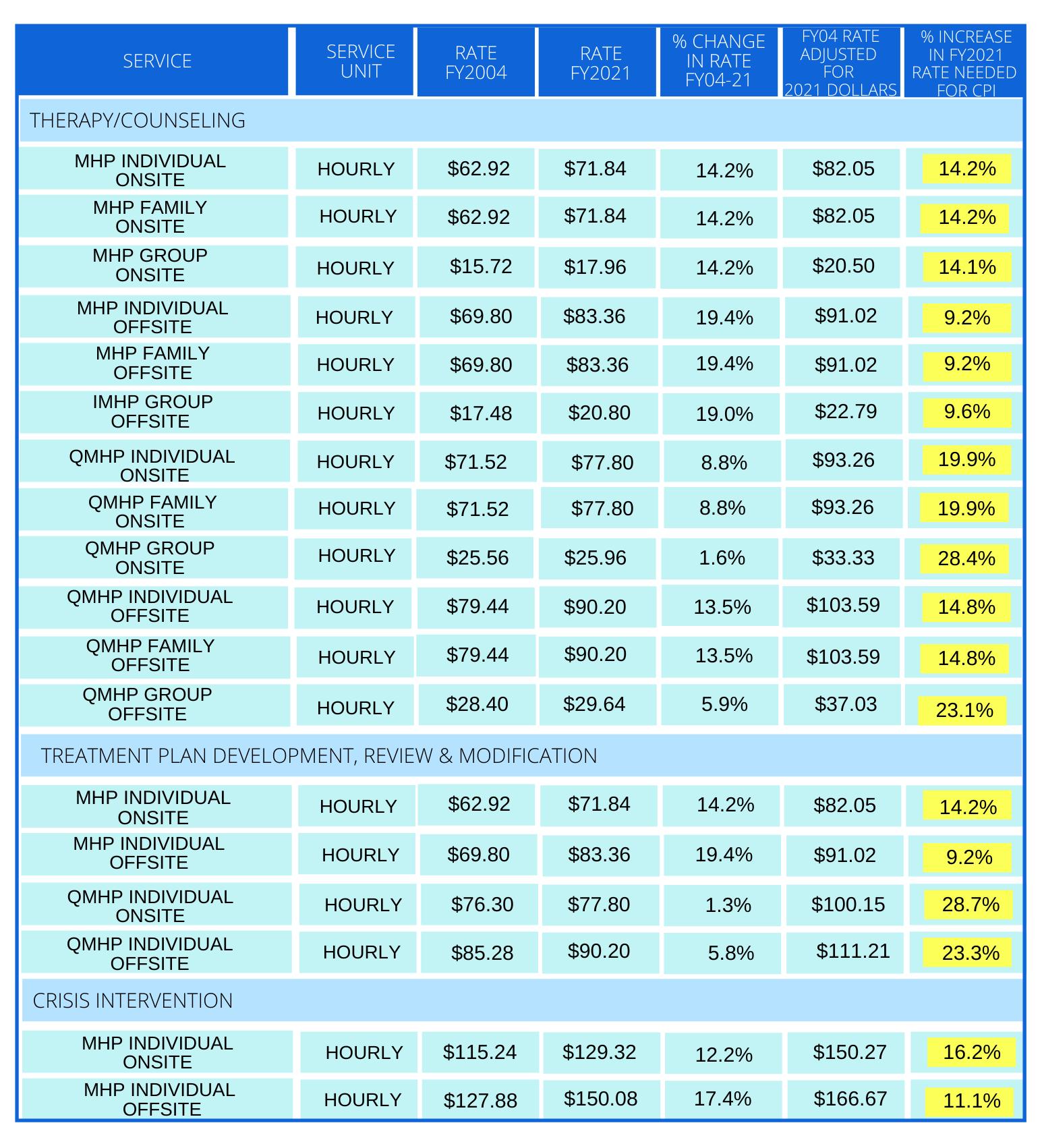
7 minute read
Mental Health
Illinois pays some of the lowest reimbursement rates in the country for fee-for-service and Medicaid Managed Care reimbursement systems for mental health services.
There are a number of community mental health services that are reimbursed through the Illinois Department of Healthcare and Family Services (HFS). Some core and essential community-based mental health services and supports are funded through provider agreements and grant agreements with the DHS Division of Mental Health, such as permanent supportive housing, crisis, supervised, and residential services. Medicaid reimbursed mental health service rates increased in 2018 and 2019. The increase did not fully compensate for the amount of rate value lost since 2008.
Advertisement
90% of mental health services assessed would need rate increases of between 10-20% to align with current CPI.
Medicaid is a major source of funding for Community Mental Health Centers, Behavioral Health Clinics, and Independent Practitioners. For the original rates report, Failing to Keep Pace, the general requirements for community mental health centers, including eligibility standards, service criteria, scope of services, and the Medicaid rate setting process, were specified in DHS Rule 132 under Title 59 of the Illinois Administrative Code. The rates were based on the average annual direct care wages and salaries for each of the direct care staff classifications - Rehabilitative Services Associate (RSA), Mental Health Professional (MHP), Qualified Mental Health Professional (QMHP), and Registered Nurse (RN) – which were obtained from State of Illinois Consolidated Financial Reports. The calculation was the sum of average annual direct care wages and salaries (including paid benefits) and annual per person overhead and administrative costs necessary for direct care staff divided by billable annual direct care staff hours. In 2019, however, the sections of DHS Rule 132 that included the service criteria and scope of services were transferred to HFS and incorporated into “Rule 140” (89 Ill. Adm. Code Part 140.453) – also known as Medicaid Rehabilitation Option (MRO). The rate setting sections were eliminated in both Rules, and any adjustments to the reimbursement rates are now determined by General Assembly appropriations. There is no standard methodology for developing rates or adjusting rates yearly. This section focuses on Medicaid reimbursed services that fall under Rule 140.
Medicaid reimbursed community mental health service rates increased in FY2018 and FY2019 but the increase did not fully compensate for the amount of rate value lost since FY2008. For FY2020, community-based mental health services were increased by 2.5%. They had received no changes in reimbursement rates since FY2008.43
Table 11 presents the services with rates data available as of FY2008. Although rates were raised starting in FY2018, if FY2008 rates were to hold equal value in FY2021, they would need to increase by 12% to keep up with the cost of living.
Table 12 presents community mental health service rates between FY2005 and FY2021.44 These reimbursement rates received adjustments between July 2005 and January 2006,45 additional small adjustments in July 2007, and some significant increases in FY2018 and FY2019, bringing some to parity with increases in the cost-of-living. While some rates increased significantly, some actually decreased. Most Mental Health rates considered in this report were increased and some have now caught up with the cost of living. However, the majority remain below cost of living increases by 11% to over 20%.
Reimbursement Rate Data
Practitioners in the mental health field report a number of challenges related to both the fee-for-service and Medicaid Managed Care reimbursement systems for mental health services. The rates do not cover costs. Illinois pays some of the lowest reimbursement rates in the country. Illinois ranked 41st out of the 50 states and Washington, D.C. in total Medicaid spending per enrollee as of 2018.46 Providers indicate that the reimbursement rates are too low to enable them to meet needs, recruit and retain staff, develop staff, and improve programs. The rates set under Rule 140 do not cover non-direct service costs such as transportation and time spent accompanying clients to appointments, as well as front and back office expenses. Administrative costs associated with billing are also not covered by current rates. Since the start of the state’s Medicaid Managed Care program in 2011, community behavioral health providers have seen a 2 to 5 fold increase in administrative costs. In order to make up for uncovered costs and additional costs from minimum wage increases, providers must supplement government funding. However, options are limited since the law prohibits providers from subsidizing Medicaid rates with any government grant funding. The HFS established rate is the maximum allowable rate for each eligible service. Reimbursement of a Medicaid service by a public payer in any amount up to the maximum allowable rate published by HFS is considered payment in full and cannot be supplemented with other government funding in any way.47 Furthermore, Medicaid does not cover several services. Traditional Medicaid fee-forservice does not cover all evidence-based services and supports that aid individuals in recovery. For example, Illinois’ Medicaid program does not provide matching funds for housing and residential services and supports. The rates discourage program quality and growth. Ideally, reimbursement for services should enable service providers to offer quality, personalized services and to expand their programs when necessary, but the Mental Health reimbursement rates do not allow salary increases or account for program startup costs. A provider would need to apply for a grant to cover those expenses. Rules and low reimbursement rates force community organizations to do more with less, often resulting in truncated treatment and fewer personalized services, further prohibiting prevention efforts to address Mental Health needs before intensive services are needed.
While the Affordable Care Act and subsequent expansion of the Medicaid program expanded health coverage for low-income Illinoisans, the Mental Health reimbursement rates never increased. Because start-up costs for onboarding new employees are not factored into rates, providers cannot increase staff and grow programs to meet the growing needs of Illinois communities. Funding supports deinstitutionalization but fails to account for investment in fee-for-service or in helping low-income individuals obtain access to treatment. The rates are increased infrequently. The process for increasing rates is difficult, undertaken infrequently, and requires legislation. The last time Mental Health services received a real rate increase was in FY2006 and the rates, calculated based on salary and overhead costs, are now outdated. Requirements of service providers make it harder to do business with already limited resources. Reporting and billing requirements necessitate paperwork and staff time – for both fee-for-service billing directly to HFS as well as Medicaid managed care billing to Managed Care Organizations. For example, in order to provide Mental Health services in Illinois, providers must be accredited by national accrediting organizations such as the Joint Commission. Medicaid managed care has complicated the billing process, so there are now more costs associated with submitting bills. Prior to March 2021, providers were required to register all clients every six months and check each individual’s financial status and Medicaid eligibility despite the fact that this step is already taken by Medicaid. This process alone required mental health providers to spend an average of 1,236 hours annually at a cost of $30,074.48 The process was modified in March 2021 to registering clients annually, however this still requires additional hours, incurs additional costs, and often creates duplicative reporting and assessments. The additional time and resources needed for compliance add an administrative burden while rates remain inadequate.
Sources: Illinois Department of Healthcare and Family Services, Fee Schedule for Providers of Community-Based Behavioral Health Services, Effective: 7/1/2020; Illinois Department of Healthcare and Family Services, Community Mental Health Service Definition and Reimbursement Guide, July 1, 2007

Sources: Illinois Department of Healthcare and Family Services, Fee Schedule for Providers of Community-Based Behavioral Health Services, Effective: 7/1/2020; Illinois Department of Healthcare and Family Services, Community Mental Health Service Definition and Reimbursement Guide, July 1, 2007; Screening Assessment and Support Services Program Service Definition and Activity Crosswalk, July 2005 and January 2006


43 Deduction made based on a comparison of data available for this report from the Illinois Department of Healthcare and Family Services Community Mental Health Service Definition and Reimbursement Guide from July 1, 2007 and September 11, 2014; Screening Assessment and Support Services Program Service Definition and Activity Crosswalk from July 2005 and January 2006. Fee Schedule for Providers of Community-Based Behavioral Health Services, Effective: 7/1/2020 44 Rates were requested from HFS dating to FY2000, but FY2005 data was the earliest information available. 45 Community Mental Health Service Definition and Reimbursement Guide, July 1, 2007; Screening Assessment and Support Services Program Service Definition and Activity Crosswalk, July 2005 and January 2006. 46 Medicaid Per Capita Expenditures. (2018). Centers for Medicare & Medicaid Services. https://www.medicaid.gov/state-overviews/scorecard/how-much-states-spend-per-medicaid-enrollee/index.html 47 Illinois Department of Healthcare and Family Services. (2014, September 11). Community Mental Health Services Definition and Reimbursement Guide. Retrieved from: http://www.hfs.illinois.gov/assets/cmhs.pdf 48 2015 Survey of mental health service providers conducted by the Illinois Association of Rehabilitation Facilities. More than Essential: Reimbursement Rates and the True Value of Human Services






